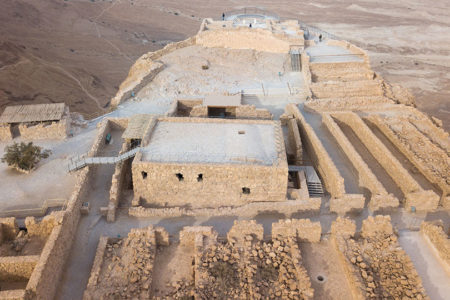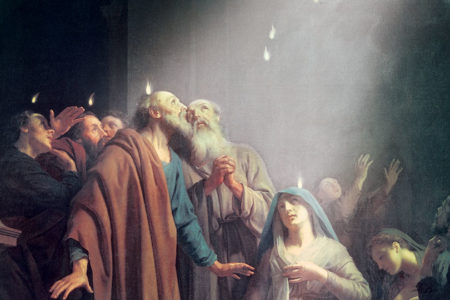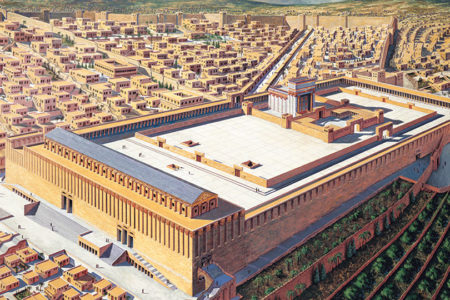Jonah’s Prayer and Promise
Jonah 1:7—2:10
In February 1891, the crew of the whaling ship Star of the East harpooned a sperm whale. In its death throes, the whale swallowed a man by the name of James Bartley.
A day and a half later, Bartley’s shipmates—who thought James had drowned—found him unconscious in the whale’s belly. Describing his experience, Bartley said he could breathe easily inside the whale, but the heat was unbearable. In fact, his appearance was completely altered. The whale’s gastric juices had permanently bleached his hands, feet, and face to a livid white.1
The account of Jonah and the “great fish” has been greatly ridiculed by Bible critics who believe it is impossible for a fish to swallow a man, let alone for a man to survive in a fish’s belly for three days. Others, who embrace the Bible’s veracity, attempt to counter these critics by claiming the account is simply an allegory or a story to reveal a moral truth, not the description of a real event.
However, there are well-documented incidents where men like James Bartley were swallowed by whales and survived to tell their stories. Furthermore, Jesus Christ accepted the account as historical fact: “For as Jonah was three days and three nights in the belly of the great fish, so will the Son of Man be three days and three nights in the heart of the earth” (Mt. 12:40). Jesus said Jonah’s experience was an illustration of His death. Thus, more than 750 years after the fact, Jesus validated the account’s authenticity.
To deny the story of Jonah is to call Christ’s statement a lie and thus deny Jesus’ claim to deity.
Jonah 1:17—2:10 clearly states that God appointed a great fish to swallow the prophet; and in so doing, He spared Jonah’s life. In the fish’s belly, Jonah realized he was incarcerated in a pit of death and that his only hope of deliverance was total dependence on God. Instinctively, the disobedient prophet thanked God for sparing his life, repented, and rededicated his life to the Lord.
Jonah’s Situation
We read, “Now the Lᴏʀᴅ had prepared [appointed or assigned] a great fish to swallow Jonah. And Jonah was in the belly of the fish three days and three nights” (1:17).
This fish could have been a sperm whale, white shark, or other huge fish that God especially prepared and appointed to swallow Jonah.
In fact, a sperm whale large enough to swallow a man was captured off Knights Key, Florida, in 1912 and is on exhibit at the Smithsonian Institution in Washington, D.C. It is 45 feet long, weighs 30,000 pounds, and has a mouth 38 inches wide. In the whale’s stomach was a fish that weighed about 1,500 pounds.
Undoubtedly, there are fish capable of swallowing men alive. The question is, “Did Jonah actually die and come back to life, or did he survive three days and nights in the fish without dying?” Some conservative scholars believe Jonah did die and was resurrected from the dead, while others believe he lived through this experience.
Those who believe Jonah died use Jonah 2:2 as a proof text. It reads, “Out of the belly of Sheol I cried.” In the Old Testament, Sheol is where departed spirits went after death. So some contend Jonah actually died and cried to the Lord in prayer while in Sheol, and God answered his prayer and brought him back to life.
Although many conservative scholars hold this position, it nevertheless is more likely that God kept Jonah alive. The prophet probably referred to the fish’s belly as Sheol because he was in the lowest pit of darkness, believing that death was imminent. Or he could have meant that the fish’s belly resembled the netherworld where the Old Testament dead resided. Since it was God who prepared and appointed the great fish to swallow Jonah, God also would have supplied what was necessary to preserve the prophet’s life.
Jonah’s Supplication
Then Jonah prayed to the Lord his God from the fish’s belly: “I cried out to the Lᴏʀᴅ because of my affliction, and He answered me. Out of the belly of Sheol I cried, and You heard my voice” (v. 2).
When Jonah was swallowed by the great fish, he realized God had preserved him from death. It must have dawned on him that God was watching over him despite his rebellion and disobedience; and Jonah broke forth in prayer to the Lord.
This prayer had six key features:
- Recitation. First, Jonah reviewed his situation in the storm: “For You cast me into the deep, into the heart of the seas, and the floods surrounded me; all Your billows and Your waves passed over me” (v. 3). In his physical distress, Jonah came to realize God’s sovereignty over his life. He instinctively knew that by God’s will, the lot the sailors had cast fell on him; and thus they had thrown him into the sea (1:7, 12, 15).
- Submission. In the throes of death, Jonah submitted to the Lord: “Then I said, ‘I have been cast out of Your sight; yet I will look again toward Your holy temple’” (2:4). Earlier, Jonah had wanted to flee from God, but now he realized the folly of his sin and cried out for God’s presence.
In faith, Jonah appealed to God for mercy. His experience brought him to repentance, and he looked toward God’s holy Temple hoping to find forgiveness. In Jonah’s day, it was to the Temple that a repentant sinner came to offer a sacrifice for his sin in the hope that God would mercifully forgive him.
- Description. Continuing to describe his suffering, Jonah said, “The waters surrounded me, even to my soul; the deep closed around me; weeds were wrapped around my head. I went down to the moorings [foundation or base] of the mountains; the earth with its bars closed behind me forever; yet You have brought up my life from the pit, O Lᴏʀᴅ, my God” (vv. 5–6).
Jonah felt the suffocating waters engulf him, and he quickly sensed that death was near. The seaweed bound his head like a rope, and the rocks at the bottom of the sea trapped him. The prophet believed he was at the gate of death. Then the great fish snatched the prophet from his watery grave, delivering his soul from “the pit” (Sheol) of death; and Jonah cried out, “O Lᴏʀᴅ, my God” (v. 6).
- Supplication. Jonah told of seeking the Lord while at death’s door: “When my soul fainted within me, I remembered the Lᴏʀᴅ; and my prayer went up to You, into Your holy temple. Those who regard [honor and worship] worthless idols forsake their own Mercy” (vv. 7–8).
Entombed in the fish’s belly, Jonah felt his life ebbing away. It was then the runaway prophet came to the end of himself. Remembering the Lord, he cried out to God as his only hope for survival. The prophet testified that God heard his prayer of repentance as he looked to the Lord for help in the face of death.
Why did Jonah mention the folly of worshiping worthless idols? Because of this experience, Jonah realized his rebellion against God’s will had become like an idol in his heart. He also realized that those who worship idols abandon all loyalty to God and sever themselves from His grace, loving-kindness, and mercy.
- Rededication. Jonah expressed appreciation for his salvation and promised to pay what he had vowed: “But I will sacrifice to You with the voice of thanksgiving; I will pay what I have vowed. Salvation is of the Lᴏʀᴅ” (v. 9).
Running from God’s call brought Jonah to the horrifying situation in which he found himself. In the jaws of death, the prophet finally saw where his sinful pride and self-will had landed him. And he cried out to God in repentance. Upon being saved from death, he lifted his voice in thanksgiving to God for sparing his life and gratefully promised to offer sacrifices and keep the vows he made to the Lord. The sailors had made the same commitment once they came to believe in the true God of Israel, and He saved them from death (1:16).
- Appreciation. Jonah concluded his prayer with “Salvation [deliverance] is of the Lᴏʀᴅ” (2:9). No other words were more fitting to summarize the prophet’s experience. Jonah was correct in his theology. Only the Lord can save. Often it takes a near-death experience for people to realize and appreciate that “salvation is of the Lᴏʀᴅ.”
Ironically, Jonah was overjoyed at God sparing his life; but later, as we shall see, the prophet was angry with God for saving Nineveh.
Jonah’s Survival
The prophet’s prayer was answered once he repented of his disobedience: “So the Lᴏʀᴅ spoke to the fish, and it vomited Jonah onto dry land” (v. 10). Many unanswered questions remain regarding Jonah’s experience. It would seem that after swallowing Jonah, the fish headed back to Israel (possibly to Joppa) to deposit him safely on dry ground.
In contrast to Jonah’s hesitancy to obey God’s command, the fish obeyed immediately and vomited the prophet onto shore. Jonah was chastened and suffered much through this experience, but he was saved from his watery grave by God’s grace and power. This lesson will serve him well, as the prophet is again commissioned to go and preach to Nineveh.
It is interesting to note that God used six miracles to bring Jonah to repentance. He caused (1) a violent storm (1:4), (2) the sailors to pinpoint Jonah through the casting of lots (1:7), (3) the sea to become calm (1:15), (4) a fish to swallow Jonah (1:17), (5) the fish to swim to shore (2:10), and (6) the fish to vomit Jonah out onto dry ground (2:10).
A great transformation took place in the fish’s belly as God answered Jonah’s prayer. After promising to keep his vows, Jonah was ready to implement the divine purpose to which God had called him. Rebellion against God’s will must be dealt with. Let us learn from Jonah’s experience.
ENDNOTE
- John Phillips, Exploring the Minor Prophets (Neptune, NJ: Loizeaux Brothers, 1998), 146.







Glory to God.